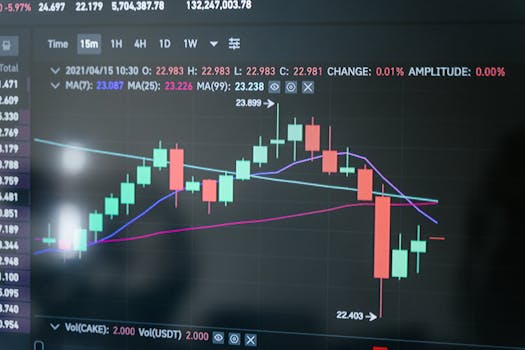
Navigating the Future: Emerging Trends in Fintech Technology
Fintech, or financial technology, has revolutionized the way we think about finance and banking. With the rise of digital payments, mobile banking, and online lending, fintech has made financial services more accessible and convenient for people around the world. As we look to the future, it’s clear that fintech will continue to play a major role in shaping the financial landscape. In this article, we’ll explore some of the emerging trends in fintech technology and what they might mean for the future of finance.
Artificial Intelligence and Machine Learning

One of the most significant emerging trends in fintech is the use of artificial intelligence (AI) and machine learning (ML). These technologies are being used to improve everything from customer service to risk management. For example, AI-powered chatbots are being used to help customers with simple tasks such as checking their account balances or transferring money. Meanwhile, ML algorithms are being used to analyze vast amounts of data and identify patterns that can help banks and other financial institutions better manage risk.
Blockchain and Distributed Ledger Technology

Another key trend in fintech is the use of blockchain and distributed ledger technology (DLT). Blockchain, which is the technology behind cryptocurrencies such as Bitcoin, allows for secure and transparent transactions without the need for intermediaries. This has significant implications for the financial industry, where transactions are often slow and expensive. By using blockchain and DLT, banks and other financial institutions can reduce costs and improve the efficiency of transactions.
Mobile Payments and Digital Wallets

Mobile payments and digital wallets are another area where fintech is having a major impact. With the rise of smartphones, more and more people are using their phones to make payments and manage their finances. Digital wallets such as Apple Pay, Google Pay, and Samsung Pay are allowing users to make payments with just a few taps on their phone. Meanwhile, mobile payment apps such as Venmo and Zelle are making it easy for people to send and receive money.
Cybersecurity and Data Protection

As fintech continues to grow and evolve, cybersecurity and data protection are becoming increasingly important. With more and more financial transactions taking place online, there is a growing risk of cyber attacks and data breaches. To combat this, fintech companies are investing heavily in cybersecurity measures such as encryption, firewalls, and intrusion detection systems. They are also implementing strict data protection policies to ensure that customer data is kept safe and secure.
Regulatory Compliance and Governance

Finally, regulatory compliance and governance are critical issues in the fintech industry. As fintech companies grow and expand, they must navigate a complex web of regulations and laws. This includes everything from anti-money laundering (AML) and know-your-customer (KYC) regulations to data protection and consumer protection laws. To ensure compliance, fintech companies must implement robust governance structures and procedures, including risk management, audit, and compliance functions.
Conclusion

In conclusion, the future of fintech is exciting and rapidly evolving. Emerging trends such as AI, blockchain, mobile payments, cybersecurity, and regulatory compliance are transforming the financial landscape and creating new opportunities for innovation and growth. As we navigate this changing landscape, it’s essential to stay informed and up-to-date on the latest developments and advancements in fintech technology.
What’s Next for Fintech?

So what’s next for fintech? One area that’s gaining significant attention is the use of quantum computing in finance. Quantum computing has the potential to revolutionize the way we approach complex financial calculations and simulations. Another area is the use of extended reality (XR) in finance, which includes virtual reality (VR), augmented reality (AR), and mixed reality (MR). XR has the potential to transform the way we interact with financial data and make decisions.
The Future of Work in Fintech

The future of work in fintech is also likely to be shaped by emerging trends such as automation and AI. As machines and algorithms take over more routine and repetitive tasks, humans will be freed up to focus on higher-value tasks that require creativity, empathy, and problem-solving skills. This will require significant changes in the way we think about work and education, including a greater emphasis on lifelong learning and skill development.
Global Fintech Trends

Finally, it’s worth noting that fintech is a global phenomenon, with different regions and countries experiencing different trends and developments. For example, in Asia, there is a growing focus on mobile payments and digital wallets, while in Europe, there is a greater emphasis on regulatory compliance and governance. In the US, there is a thriving fintech ecosystem, with many startups and established companies innovating and disrupting the financial landscape.
Fintech and Financial Inclusion

Fintech also has the potential to promote financial inclusion, particularly in developing countries where access to traditional banking services is limited. Mobile payments and digital wallets can provide people with a safe and convenient way to store and transfer money, while online lending platforms can provide access to credit for small businesses and entrepreneurs. By leveraging fintech, we can create a more inclusive and equitable financial system that benefits everyone, not just the wealthy and privileged.
Fintech and Sustainability

Finally, fintech can also play a critical role in promoting sustainability and reducing our environmental impact. For example, digital payments can reduce the need for paper and plastic, while online banking can reduce the need for physical branches and transportation. By leveraging fintech, we can create a more sustainable and environmentally-friendly financial system that benefits both people and the planet.
Fintech and Education

Fintech also has the potential to transform the way we think about education and financial literacy. Online platforms and mobile apps can provide people with access to financial education and training, while AI-powered chatbots and virtual assistants can provide personalized financial advice and guidance. By leveraging fintech, we can create a more financially literate and informed population, better equipped to manage their finances and achieve their goals.
Fintech and Healthcare

Finally, fintech can also play a critical role in improving healthcare outcomes and reducing healthcare costs. For example, digital payments can simplify the billing and reimbursement process, while online platforms can provide people with access to health insurance and other healthcare services. By leveraging fintech, we can create a more efficient and effective healthcare system that benefits both patients and providers.
Fintech and Government

Fintech can also play a critical role in improving government services and reducing bureaucracy. For example, digital payments can simplify the process of paying taxes and fees, while online platforms can provide citizens with access to government services and benefits. By leveraging fintech, we can create a more efficient and effective government that benefits both citizens and businesses.
Fintech and Non-Profit

Finally, fintech can also play a critical role in supporting non-profit organizations and charitable causes. For example, digital payments can simplify the process of donating to charity, while online platforms can provide non-profits with access to funding and resources. By leveraging fintech, we can create a more efficient and effective non-profit sector that benefits both donors and recipients.
Fintech and Environment

Fintech can also play a critical role in promoting environmental sustainability and reducing our carbon footprint. For example, digital payments can reduce the need for paper and plastic, while online banking can reduce the need for physical branches and transportation. By leveraging fintech, we can create a more sustainable and environmentally-friendly financial system that benefits both people and the planet.
Fintech and Social Impact

Finally, fintech can also have a significant social impact, particularly in developing countries where access to traditional banking services is limited. Mobile payments and digital wallets can provide people with a safe and convenient way to store and transfer money, while online lending platforms can provide access to credit for small businesses and entrepreneurs. By leveraging fintech, we can create a more inclusive and equitable financial system that benefits everyone, not just the wealthy and privileged.
Fintech and Innovation

Fintech is also driving innovation in the financial industry, with new technologies and business models emerging all the time. For example, blockchain and distributed ledger technology are being used to create new types of digital assets and securities, while AI and machine learning are being used to improve risk management and customer service. By leveraging fintech, we can create a more innovative and dynamic financial industry that benefits both consumers and businesses.
Fintech and Regulation

Finally, fintech is also subject to regulation and oversight, particularly in areas such as consumer protection and anti-money laundering. Regulators are working to create a framework that supports innovation and growth, while also protecting consumers and maintaining financial stability. By leveraging fintech, we can create a more efficient and effective regulatory system that benefits both businesses and consumers.






